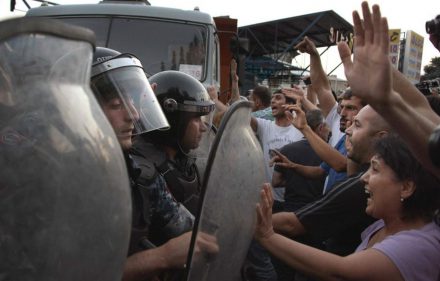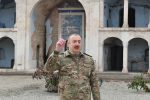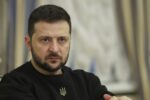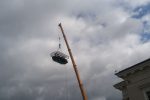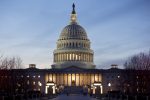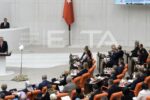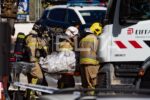By slaptai.lt
Serzh Sargsyan is the President of Armenia and opinions of him are rather mixed in Armenia and in the rest of the world. He won presidential elections in 2008 and once again in 2013. Before becoming a president this man was not a complete political novice. Born in Nagorno-Karabakh, he spent his youth as a zealous Komsomol, the Communist Party agitator and agent of nomenklatura. According to some sources, he participated in attacks against Azerbaijani community of Nagorno-Karabakh. In 1989 he became a leader of Nagorno-Karabakh “self-defence” troops. From 1993 to 2008 he took various high-ranking posts in Armenia, from the Minister of Defence to the Head of President‘s Administration.
There are numerous dirty stories related to him, but this article is not about the President, but rather about his family, which handles matters according to the greatest traditions of traditional mafia families. In Lithuania we have a web of such traditions in Pagėgiai region, governed by the family of Komskiai brothers. Looking deeper into actions of Sargsyan brothers, a simple question arises – has any member of Komskiai family worked in Armenia? Because similarities are clear, only on a different scale. Let us remind you, that the Mayor of Pagėgiai Virginijus Komskis is often labeled as a contraband king, however, no one has been able to catch him in action. In the preceding Seimas his Brother Kęstas Komskis led a Seimas Anti-corruption Commission until the law enforcement caught him forging results of elections after what he was expelled from the current Seimas.
And what about the third brother Arvydas, who shot Ramzis, a dog belonging to Lithuanian border guards? This shot, which was fired just prior to the Seimas elections, added even more suspicion and speculations of this family relation to smugglers, and even further weakened popularity of “Tvarka ir teisingumas” Political Party belonging to the ousted president Rolandas Paksas. But let us return to Armenia.
While analyzing processes that are happening in Armenia, a conclusion can be made that this brotherly union of the criminal world and the state government reached such a scale that now it would be the time to announce this country as dangerous to the global law and time to start a special Interpol operation in it. No matter how Armenian Diaspora would try to present Armenia as a cradle of global civilization and culture, or an oasis of democracy and justice in Caucasian region, fangs of immoral and dishonest beast are still visible behind the mask of decency.
Armenian government seeks money everywhere, but not in really money-rich places. In other words, they seek money everywhere but their own pockets. While sitting on money bags they look across the world for a small change. Such situation can be observed in all public structures. Many high-ranking Armenian politicians and officials are at the same time rich businessmen. Of course, they claim that an official or politician is not prohibited by law to have personal business and the only prohibition is active management of that business. Millions, maybe billions of dollars are accumulated in both Armenian and foreign bank accounts of these businessmen.
According to calculations of various independent experts, during the last 12 years alone, more than 7 billion dollars were exported from Armenia. It is hard to say, what sum has it become after all investments, but judging by small bank deposit percent, we can only guess how much money was generated by that sum of money exported from Armenia.
One of the leading bosses of contemporary Armenian mafia is none the other but Aleksandr Sargsyan, brother of the current president Serzh Sargsyan. Aleksandr is also called “Sashik 50 percent”. The story of this nickname is as follows: everyone who had business with him knows that he always demands “his” 50 percent share. For example, Aleksandr Sargsyan suddenly takes a liking of some restaurant in Yerevan and he decides to acquire it. Then negotiators are sent with a proposal that cannot be refused. As Sashik takes only his 50 percent, a restaurant usually agrees to such proposal and transfers part of the business to unofficial master of the country economy.
In today‘s Armenia there is no such even slightly profitable branch of business where Sashik would not have his influence. Those businessmen who refute proposals of President‘s brother have very hard times. Some of them are assaulted by unknown attackers, others are forced to leave the country, and others are just simply killed, what exactly happened with the owner of “Vanadur” restaurant in Yerevan Ardon Handian. Such drastic actions take away any intentions to oppose Sashik‘s proposals.
Sashik does not forget to legalize his illegally acclaimed funds which later are transferred from the country and used to buy houses, restaurants, hotels, night clubs and businesses in foreign lands. According to some sources, Sashik exported over 200 million dollars to the United States. For example, in 2005, he bought a luxurious villa in Tarzana, California, for 2.8 million dollars. Now it is worth over 3.5 million.
Of course, Sashik sometimes had some problems with the United States. According to the article on Sargsyan brothers in georgiatimes.info, during one open interview in 2005 he complained that he was not let into the country because of wrongly filled customs declaration. When he flew to the USA, he had 30 million dollars of undeclared money in his pockets. He was not let into the country and had to take the nearest flight back to Armenia.
Aleksandr Sargsyan has businesses and properties not only in America, but also in Russia, Spain, Czech Republic and Bulgaria. He exports sheep from Armenia to Iran and the United Emirates of Arabia. He even created a monopoly. Since the old times sheep market in Armenia belonged to Kurds, however, President‘s brother decided that such a profitable business cannot belong to some small national minority and Kurds encountered such a pressure that soon had to transfer their businesses to Sashik.
Fruit import in Armenia is also supervised by Sashik‘s companies. A great deal of road traffic cameras and radars in Armenia are the property of companies related to President‘s brother. Only 30 percent of funds gathered from the collected fines goes to country‘s budget, while 70 percent stay in Sargsyan’s pockets.
Sashik coordinate his actions with his brother Serzh and he mentioned this fact more than once in semi-public interviews. Aleksandr is a more simple man than Serzh. He does not talk about incomprehensible values, he does not act as a defender of justice – he makes money and is proud of it. Part of the population likes him and they honestly support him. The other part is afraid of him and thus they only pretend to support him. And if enemies appear, well, Sashik often brags about his professional body guards that are the best not only in Armenia but in the whole Caucasus region.
Even though President Serzh Sargsyan often talks about economic freedom in Armenia, his brother Aleksandr is the best example, that there is no trace of such freedom. Sure, Serzh Sargsyan sometimes likes to talk about interests of Armenian nation, democracy, human rights and advantages of modest life, but the example of Aleksandr Sargsyan shows that all of this are only a meaningless sweet-talk to brainwash local prudes and foreigners. Sashik‘s actions silently inform Armenians that they cannot trust in Sargsyan brothers because all of them are similar, only not so simple and straightforward as Sashik.
Another brother of the President, Levon Sargsyan, manages one of the departments of Yerevan University faculty of Theology and also supervises area of elite constructions. This brother became infamous in his perfectly planned con schemes. Foreign investors are lured to Armenia where they become interested in construction of elite houses but after collaboration with Levon they are left with nothing – no money, no projects. Currently in Armenian court there are five lawsuits by foreign investors, however, it is more than clear, that these cases will not be truthfully and objectively solved while Sargsyan remains in president‘s post.
An important role in laundering illegal Sargsyan money belonged to Serzh Sargsyan’s son-in-law Mikael Minasian, nicknamed Mishik. Three years ago he was appointed Armenian envoy to the Holy See what enabled him to pump family money to Western European banks. He also received help from Armenian ambassador in the Great Britain Armen Sargsyan.
In addition, son-in-law of Armenian President controls 80 percent of Armenian media, including “Panarmenian” media group, Armenia TV, Hay TV, ATV, such websites as tert.am, news.am, blognews.am, asekose.am and others. Not to mention a directly related cafe network “Jazvee”, tobacco industry, etc.
Thus, Armenian monarchists, if they exist, can be pleased, as their country is ruled by family, which has more influence than most medieval European absolute monarchs. Only time will tell if this family grows into dynasty. Mean while, it is clear that there is no scent of democracy, human rights or transparent government in current Armenia.
2017.10.24; 05:16


